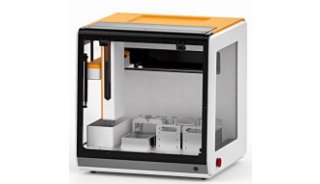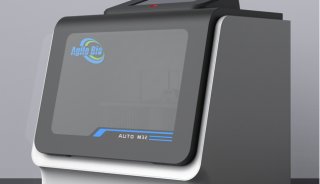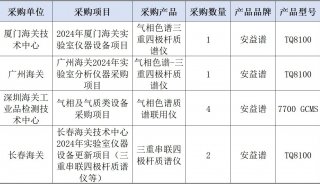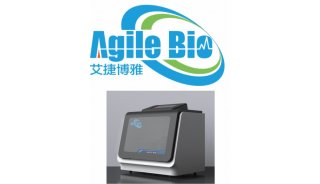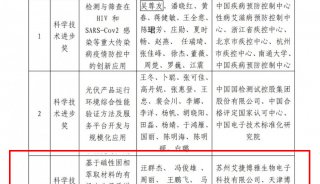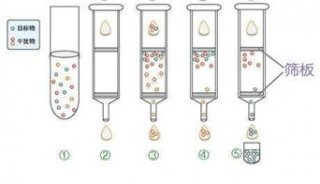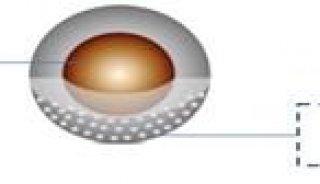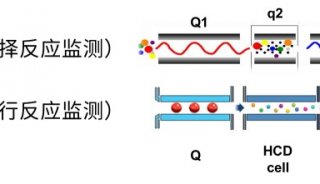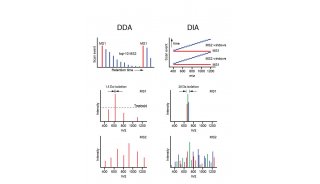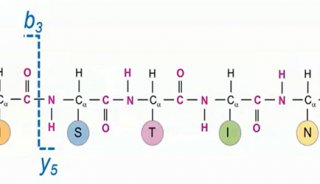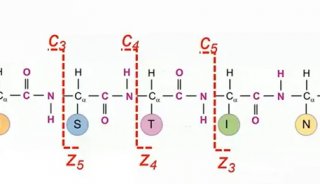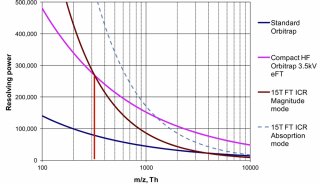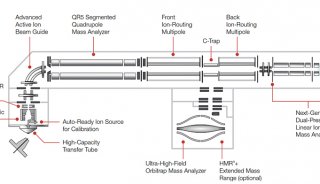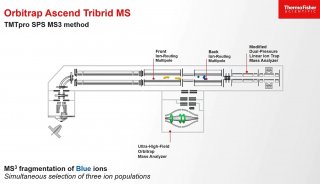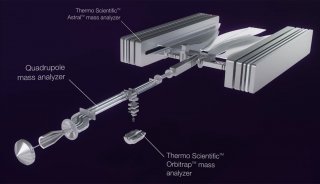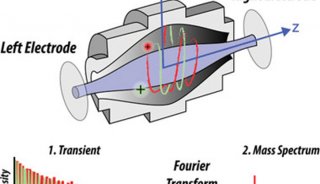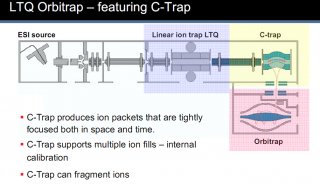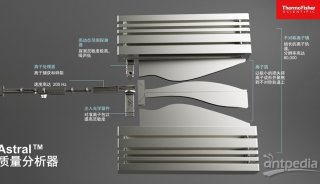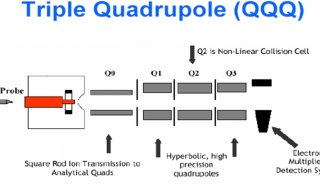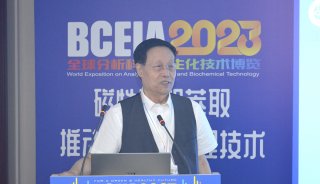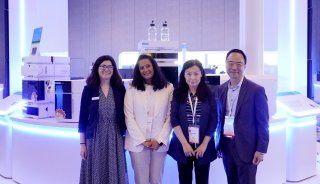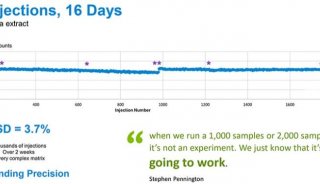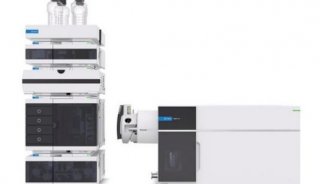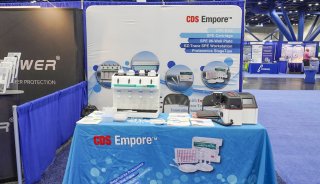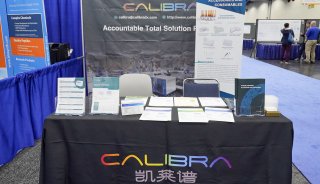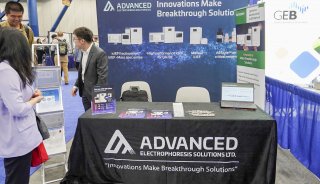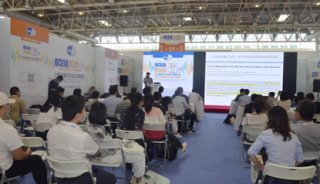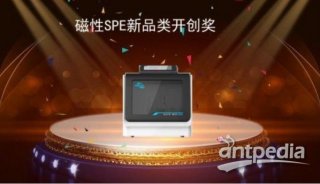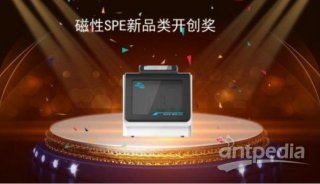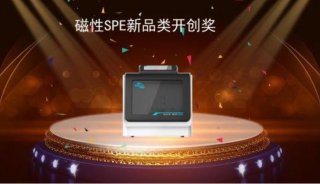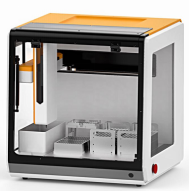艾捷博雅磁性固相萃取技術亮相ASMS 2024美國質譜學會年度會議暨展覽會

引言
The?conventional column and?plate solid-phase extraction (SPE) format encounter various unresolved issues, such as inconsistent flow rates, column clogging from protein precipitation, and packing bed channeling?due to polymer SPE materials swelling and shrinking with solvent changes.
傳統的固相萃取(SPE)如柱式和板式,存在各種未解決的問題。如流速不一致、SPE柱因蛋白質沉淀而堵塞,以及聚合物SPE材料在溶劑變化時由于膨脹和收縮而產生“溝渠效應”。
A promising alternative, moving bed SPE employing mesoporous paramagnetic sorbents, has superseded traditional column SPE methods, facilitating complete automation of the extraction process. Rather than passing samples through a static SPE column or packed bed, the innovative SPE techniques involve moving sorbents, which have adsorbed analytes, from samples to one or more vessels containing rinsing solvents. Subsequently, the sorbents are transferred from the rinsing vessels to the elution vessel, where analytes are eluted from the sorbent into the solution.
一種有前景的替代方案——使用介孔順磁吸附劑的移動床固相萃取,已經取代了傳統的柱式固相萃取方法,實現了萃取過程的完全自動化。不同于將樣品通過靜態SPE柱或填料床,這種新型SPE技術包括:首先將已吸附分析物的吸附劑從樣品轉移到一個或多個含有沖洗溶劑的容器中;隨后,吸附劑從沖洗容器轉移到洗脫容器,將分析物從吸附劑洗脫到溶液中。

Figure 1. Workflow?of moving-bed extraction by m-SPE
圖1. m-SPE移動床萃取工作流程

Figure 2. Auto M32 m-SPE pretreatment system
圖2. Auto M32磁固相萃取前處理系統
技術方案及亮點
The magnetic separation material comprises a magnetic core encased in a silicone or polymer shell with controlled apertures ranging from 80 to 100?, achieved through specialized control techniques. This design leverages a physical size exclusion effect where the pores facilitate the entry of small molecules while restricting larger molecular interference substances. This strategy effectively mitigates the matrix effect and fulfills the objectives of purification, enrichment, and detection.
磁分離材料包括一個磁核,其外表包覆有硅膠或聚合物殼,并通過特殊技術將孔徑控制在80~100?之間。這種設計利用了物理尺寸排除效應,孔隙有助于小分子進入,同時限制較大的分子干擾物質。這種方法有效地減輕了基質效應,并實現了純化、富集和檢測的目標。

Figure 3. Process of magnetic beads production
圖3. 磁珠生產過程
The magnetic core packaging process is crucial to prevent oxidation and demagnetization. Ensuring uniform mesoporous apertures and a high specific surface area are essential for achieving optimal sample loading and recovery. Application of RAM technology on the microsphere's outer surface reduces the adsorption of protein colloids. Additionally, employing molecular imprinting technology optimizes the inner surface modification of microspheres, thereby enhancing the enrichment capacity for catecholamines and vitamin K.
磁核的包裹過程對于防止氧化和磁化喪失至關重要。并且要確保微球介孔孔徑均勻和高比表面積,才能得到好的載樣量以及回收率。球的外表面應用RAM技術可減少蛋白膠體的吸附。此外,采用分子印跡技術優化了微球的內表面修飾,從而增強了對兒茶酚胺和維生素K的富集能力。

Figure 4. Bonnacats magnetic beads remain stable in acidic conditions without?metal leaching
圖4. Bonnacats磁珠在酸性條件下保持穩定,不會釋放金屬

Figure 5. Comparison of recovery rates to? conventional column extraction
圖5. 與傳統柱式萃取方法的回收率比較

Figure 6. Comparison of sample loading to existing market products
圖6. 與現有市場產品的上樣量比較
Table 1. Comparison between m-SPE and conventional SPE techniques
表1. 磁固相萃取(m-SPE)與傳統固相萃取(SPE)技術比較

方法
Auto M32 system was used for the extraction and purification of catecholamine targets from plasma samples containing six endogenous targets. Specifically, the corresponding solvent was transferred into a designated 96-well plate. Subsequently, the Auto M32 Fully Automatic Sample Pretreatment System conducted magnetic extraction of the samples. Upon completion of the extraction process, the eluent obtained was injected into an LC-MS/MS system for subsequent analysis and testing.
Auto M32用于從血漿中提取和純化兒茶酚胺。將相應的溶劑轉移到指定的96孔板中,然后Auto M32全自動樣品前處理系統對樣品進行磁性萃取。提取完成后,將洗脫液注入LC-MS/MS進行檢測。
Table 2. Operating procedures of Auto M32 m-SPE pretreatment system
表2. Auto M32磁固相萃取前處理系統的操作步驟

結果
Recovery Rates
回收率及平行性
Table 3 shows the results obtained from plasma samples collected from a healthy individual. Following the addition of six catecholamine internal standards, the observed recovery rates ranged from 95.2% to 116%, with corresponding relative standard deviations ranging between 1.4% and 9.3%. The test was performed in duplicate parallel runs.
如下表所示,取某正常人血漿,添加六種兒茶酚胺類目標物,兩次平行處理。所得回收率95.2-116%,相對標準偏差1.4-9.3%。該測試進行了重復的平行實驗。
Table 3. Recovery rates and relative standard deviations of 6 catecholamine targets in plasma samples
表3. 血漿樣品中6種兒茶酚胺目標的回收率和相對標準偏差Comparison of sample loading to existing market products

Reproducibility of Continuous Internal Standard Peak Area
As presented in Table 4, utilizing standard samples with a plasma concentration of 0.2ng/mL (3-MT, 0.02ng/mL) as a representative case, the relative standard deviation of the internal standard peak area ranged from 4.4% to 9.7%. The test was performed in six parallel runs.
連續內標峰面積重現性
如下表所示,取血漿濃度為0.2ng/mL(3-MT,0.02ng/mL)標準樣品平行處理六次,內標峰面積相對標準偏差4.4-9.7%。該測試進行了六次平行實驗。
Table 4. Peak areas of 6 catecholamine targets in 6 parallel runs
表4. 在6次平行實驗中6種兒茶酚胺目標物的峰面積

Standard Curve
Standard Curve Linearity and Accuracy of Six Catecholamines, as Shown in Table 5.
標準曲線
如下表所示,六種兒茶酚胺類標準曲線線性及其準確度。
Table 5. Standard curves of 6 catecholamine targets
表5. 6種兒茶酚胺目標的標準曲線

結論
The advancement of mesoporous paramagnetic extraction materials and the automated moving-bed extraction method represents a pivotal development. It not only ensures the consistency of trace substance extraction and precise detection of biological samples but also markedly enhances efficiency and extraction speed through complete automation. This breakthrough in sample preparation automation signifies a significant stride forward for the application of LC-MS in clinical testing.
介孔順磁萃取材料的優勢以及自動移動床萃取方法代表了一個關鍵性的進展。它不僅確保了微量物質提取的一致性和生物樣品檢測的精確性,而且通過完全自動化顯著提高了效率和提取速度。樣品制備自動化這一技術的突破,標志著LC-MS在臨床測試中的應用向前邁出了重要一步。
蘇州艾捷博雅歡迎您蒞臨
ASMS展位No. 238,Poster編號WP118
END










